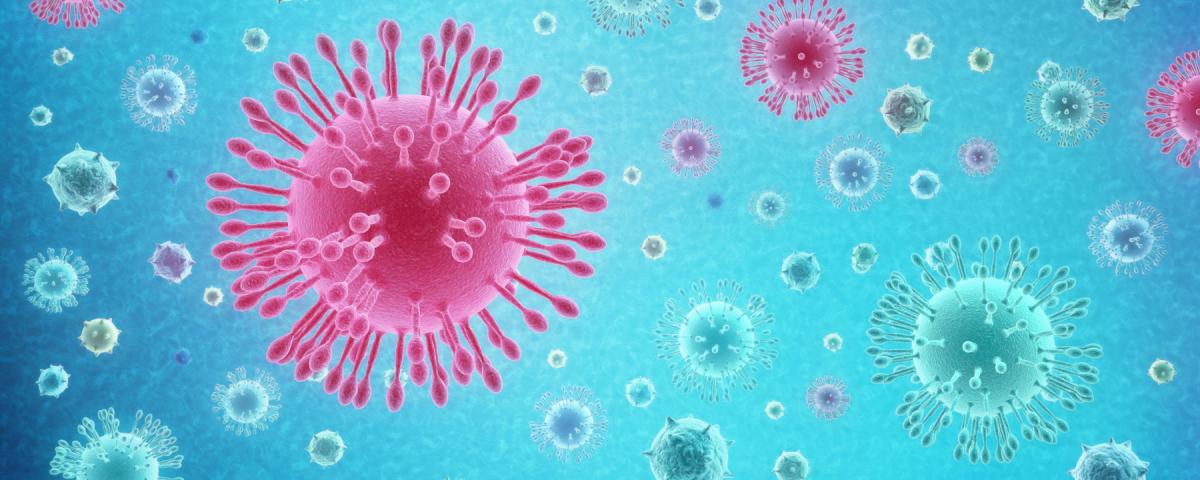New Scientific Study Confirms Coronavirus Sufferers Having Difficulty
Expelling CO2 As Previously Stated On The SiteMay 11. 2020

Coronavirus (image credit: thescientist.com)
This is a follow up to the article "Reports Confirm Obesity And
Compromised Immune System Linked To Severity Of Coronavirus Infections
As Previously Stated On The Site." In the
April 10, 2020 article I stated "Overweight and elderly are
high risk groups who need immediate medical care and
monitoring once they begin showing symptoms of the
coronavirus. In overweight people the body is not
converting enough CO2. That's the deficiency. It can
lead to a host of medical problems and complications, given
the wrong environment and circumstances."
CO2 is Carbon Dioxide. A month later on May 4, 2020,
in an article published on Yahoo.com, in reference to coronavirus
sufferers, stated about CO2 (Carbon Dioxide) and its involvement in
a newly coined condition called Happy Hypoxics, "'The brain is tuned to
monitoring the carbon dioxide with various sensors,' Paul Davenport,
a respiratory physiologist at the University of Florida, told
Science Magazine. 'We don’t sense our oxygen levels.' This means
that people will be able to breathe comfortably, despite low
blood-oxygen levels, until their lungs can no longer expel carbon
dioxide, sending alarming signals to the brain."
Therefore, my article a month prior was indeed
correct regarding CO2 and coronavirus (Reports Confirm Obesity And
Compromised Immune System Linked To Severity Of Coronavirus Infections
As Previously Stated On The Site).
STORY SOURCE
Mysterious ‘happy hypoxics’: What doctors know about the
latest coronavirus condition
May 4, 2020 - Doctors are learning that what’s
happening outside a coronavirus patient is not a true reflection of
what’s happening on the inside. Patients with COVID-19 — the disease
the virus causes — with dangerously low blood-oxygen levels appear
to have normal breathing, yet such levels usually amount to
unconsciousness or even death, according to U.S. doctors.
The phenomenon is called hypoxia, and medical
professionals are trying to figure out if early detection along with
home monitoring can make the difference between life or death,
especially now that most people are afraid to step foot in a
hospital.
“It’s intriguing to see so many people coming in,
quite how hypoxic they are,” Dr. Jonathan Bannard-Smith, a
consultant in critical care and anesthesia at Manchester Royal
Infirmary in England, told The Guardian. “We’re seeing oxygen
saturations that are very low and they’re unaware of that. … It’s
very much more profound and an example of very abnormal physiology
going on before our eyes.”
Normal blood-oxygen levels tend to stand between 95%
and 100%; anything below the minimum can lead to shortness of
breath, rapid heartbeat and chest pain, according to Healthline.
But COVID-19 patients don’t seem to be showing these
symptoms, despite having oxygen saturation levels in the 80s or 70s,
with some pushing below 50%, The Guardian reported. Clinicians are
calling them “happy hypoxics.” These levels are similar to those of
people in high altitudes, such as mountain climbers. Part of the
reason is that the brain is not equipped to monitor drops in oxygen
levels.
“The brain is tuned to monitoring the carbon dioxide
with various sensors,” Paul Davenport, a respiratory physiologist at
the University of Florida, told Science Magazine. “We don’t sense
our oxygen levels.”
This means that people will be able to breathe
comfortably, despite low blood-oxygen levels, until their lungs can
no longer expel carbon dioxide, sending alarming signals to the
brain.
Other possible explanations are simply unknown,
scientists admit. There’s growing evidence that SARS-CoV-2 — the
virus driving the pandemic — can cause clots to form in the blood.
The clots could then block oxygen flowing through tiny,
already-inflamed vessels in the lungs from entering the bloodstream.
To combat this, some doctors are experimenting with
blood thinners to prevent and treat severe COVID-19 complications,
outlets report. A pulmonologist from São Paulo, Brazil, gave heparin
— a common blood thinner — to a patient who had breathing troubles
and circulatory problems in her toes, and both issues recovered,
according to Science Magazine...
https://www.yahoo.com
RELATED ARTICLES
China And New York Hospitals Using
Vitamin C To Aid In Treating Coronavirus Patients (Confirming Previous
Claims)
Reports Confirm Obesity And
Compromised Immune System Linked To Severity Of Coronavirus Infections
As Previously Stated On The Site
Scientists Confirm 8 Coronavirus
Strains Are Circling The Globe (Covid-19)
Site Exclusives

